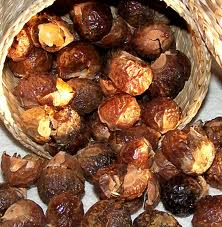 As prices at the grocery store continue to steadily climb, many (including myself) are looking for alternatives to the normal brands in order to save the family budget. I have just discovered soap nuts and I believe I am in love with these little guys. At 14 cents per load, soap nuts are already very economical, not to mention all natural, versatile, and have a storage life that can last for years!
As prices at the grocery store continue to steadily climb, many (including myself) are looking for alternatives to the normal brands in order to save the family budget. I have just discovered soap nuts and I believe I am in love with these little guys. At 14 cents per load, soap nuts are already very economical, not to mention all natural, versatile, and have a storage life that can last for years!
Soap nuts or soap berries are the dried fruit of the Sapindus tree that contains a natural soap ingredient called saponin. Researching this dried fruit further, it actually has a multitude of other uses including some anti-inflammatory and anti-microbial properties.
Soap nuts can be used whole or made into liquid form to clean the body and hair, can be used on pets and is also an a gentle but effective mosquito repellant that can even be used on children and pets. The best part is they can be reused several times and then composted. They also work as a natural fabric softener which is great for line drying and are gentle enough to use with septic and gray water systems.
Other uses include:
- Hand soap
- Dishwasher soap
- Window cleaner
- All-purpose cleaner
- Shampoo
- Pest and mosquito repellant
- Carpet cleaner
- Pet shampoo
- Lice remover
- Jewelry cleaner
A liquid can easily be made from the soap berries and poured into ice cube trays and frozen for future uses. Melt them as needed, or just toss some in with your laundry. If you are making other soap nut cleaners, melt as many as needed for the solution. If you make a large batch of this liquid, it can be preserved for future uses.
To preserve the liquid:
You will need resealable and sterilized quart jars and soap nut shells (this is the kind we use).
Place the equivalent of 7-10 soap nuts in each jar. (It’s better to use smaller soap nut pieces). Fill with boiling water but leave a 1/2 inch space at the top. Place the lid on securely.
PRESSURE COOKER: Place the jars in the canner, and process according to manufacturer’s instructions for 15 minutes at 10 lbs of pressure.
Use only canning jars if you use this method.WATER BATH: Place the filled jars in a large pot of boiling water. Make sure to cover the jar completely. Bring to a rolling boil and set the timer for 30 minutes. Remove jar from boiling water and let cool.
OVEN METHOD: Preheat the oven to 250F. Place 7-10 soap nuts in a clean glass quart jar with a resealable lid. Fill with boiling water but leave 1/2 inch at the top. Place lid on securely. Watch until it starts to bubble and then time it for 30 minutes.Turn off oven and let cool a little. Remove from oven.
Once the soap nut liquid is made, essential oils can be added to make the formula more powerful or water can be added to dilute the formula for other uses. To learn more about soap nut uses, click here.
In dried fruit form, soap nuts can last for years as long as it is stored properly and kept away from humid conditions. Soap nuts can be stored along with your other preparedness items in a five-gallon bucket with a lid. While the color of the dried fruit tends to deepen with age, the active ingredients are still at your disposal.
Many “off-gridders” prefer the soap nuts that are broken as they release the cleaning agent more easily. The suppliers do not always list the soap nut pieces on their web site if you contact them they often times will sell the “broken” soap nuts at a largely discounted price, especially if you are buying in bulk.
Soap nuts can easily be purchased on Amazon, or in many homesteading shops like Lehman’s. An alternative to this is to go full prepper and buy your own soap nut tree.
With these little guys tucked away in the preparedness closet, there should be minimal concerns with sanitation issues during a SHTF emergency. Happy cleaning!

Horse chestnut (leaves and bolsters) will also make a mild and desinfecting soap. Check what grows locally, because importing such from far away has an often negative impact on the local community there. The demand becomes to high and there is nothing left for them or greed and big companies take over leaving the locals with the mess and (almost) none of the profits.